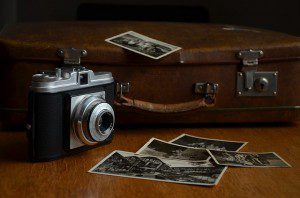
On the wall of my bachelor uncle’s bedroom, in my paternal grandparents’ house, there were two black and white photographs of ugly people.
One photo portrayed a group of people dressed like pilgrims– the men and boys in black suits, the women in long black dresses with white aprons and bonnets. Young children and babies were posed up front in a line, the girls in ruffled white dresses. Nearly everyone in the photo was haggard, careworn, and frowning murderously at the camera. Even the children looked tired and angry.
Toward the front, behind the row of white-clad girls, there was a young woman without a bonnet, her dark hair swept into one of those shiny Edwardian up-dos, wearing a white blouse and smiling.
The other photograph was from a different era of history. I couldn’t tell which one– only that it was ugly, and the people in it were grim. There was a woman seated in the center of the photo whom I knew must have been related for my grandfather; she looked exactly like my grandfather in a yarn wig. She wore a boxy drop-waist dress with an oblong spotted apron tied around her waist. Standing around her were young women with crimped hair in boxy dresses and awkward teenage boys in ill-fitting suits with slick hair and big ears.
Every one of them looked furious– and more than furious. They looked shell-shocked, as if they were in a prison camp posed for a photo against their will.
I hope I’m wrong about how they felt– I hope they were just bored teenagers, posing for a photo with a tired mother.
It turns out that these angry people were my family. The smiling woman in the white blouse and the woman in the chair with the oblong apron were the same– my great grandmother, my father’s father’s mother. Her name was Rosetta.
I found out all about Rosetta from my grandfather and my bachelor uncle. My grandfather was a showoff who loved to tell stories, the more scandalous the better, and my uncle had that wonderful defect so common to bachelor uncles–he thought that children who were busy, were not listening. I used to play quietly with the toys in my grandmother’s sitting room, while my grandfather and my uncle told stories about my grandfather’s family.
Rosetta was a “Dunker:” a member of the Church of the Brethren, who believed that no baptism was valid unless the catechumen was fully immersed three times, one for each Person of the Holy Trinity. The Dunkers were a strict people. They did not allow smoking, drinking, dancing, immodesty or colorful clothes; virgin girls wore stuffy white, and everyone else wore stuffy black. I can’t say if they were a cruel or a kindly people– based on their photograph, I would say cruel. But one can never tell with photographs from that era of history.
I hope they were kind.
I hope Rosetta was kind.
Rosetta did not stay with the Dunkers. She moved into town. She found work as a housekeeper for three well-to-do brothers, living together in the same house. And, before too long, she was pregnant, and then she began to “show.” The oldest brother, Eugene, quietly married her to avoid a scandal.
I hope they loved each other, but I don’t think they did.
I hope someone loved Rosetta.
Rosetta gave birth to a son she named Orlando– my great uncle. I don’t know why she called him that. She was of German heritage, not Italian, and Eugene was a WASP. I like to imagine she got the name out of Shakespeare, but I get the impression that she was barely literate. Next, she and Eugene had a boy equally mysteriously named Alonzo, then Wealthy, Sarah, Cyril, Christa, John and Robert.
Robert was my grandfather. Christa, John, Orlando and Alonzo died before I was born. I remembered meeting Uncle Cyril once, and then going to his funeral a month later, when I was in preschool. No one had told me he was dying, and I was in shock. I remember Aunts Sarah and Wealthy at Aunt Wealthy’s hundredth birthday party, and then Aunt Wealthy’s funeral ten months later. Anyone could tell that Aunt Wealthy was dying; she was blind, deaf, forgetful and brittle as a paper hornet’s nest at her party. No one ever told me why Wealthy had been named that particular adjective. Perhaps Eugene valued money the way people who name their daughters “Chastity” value that virtue.
I hope “Wealthy” wasn’t a traditional name among the Dunkers. They seemed eccentric enough.
My grandfather said that one of his earliest memories was watching his mother’s Dunker friends come to the side door on Wednesday nights to have their throats blessed. Rosetta was a healer, after a fashion; her technique was a mixture of herbal remedies, prayer and something like magic– art passed down among her people, oldest daughter to oldest daughter, but Aunt Wealthy called it nonsense and refused to learn it. Wealthy had no children, so the gift has well and truly died out of our family line, if it was a gift at all. I’m told the devil is involved in such things.
I was inclined not to believe my grandfather’s story about the healing gift. But then my father, who has no imagination or flare for the dramatic, confirmed it. He’d only met Rosetta once or twice, when he was no older than I was at Uncle Cyril’s funeral. And on one of those occasions, my father burned his hand badly on the cast iron wood stove. Rosetta had silently blown and gestured over the burn, and it disappeared, without pain or a blister, in the space of a minute.
I hope that wasn’t the devil’s doing.
Rosetta and Eugene quietly divorced after the last of their children was married. On his deathbed, Eugene formally disowned Uncle Orlando, explaining he’d been his youngest brother’s son all this time. Orlando left town without any of his father’s money, in the company of a person the family called a “loose woman,” though I wouldn’t trust their opinion on anyone’s character. No one found out what happened to him until decades later, when his daughter showed up unexpectedly at Uncle Cyril’s funeral. She and I were introduced, and she unsettled me– she was at least fifty years my senior, yet had, by pure coincidence, the exact same first, middle and last name that I did. Such things are eerie to a five-year-old.
I don’t know what happened to Rosetta. Everyone in the family must have known– my father met her, after all, in the house with the wood stove, though he never said where that house was. I like to imagine she went back to the Dunkers, who were a kindly people in spite of their strict traditions, and who welcomed her with open arms. I like to believe she took off her ugly dropwaist dresses and went back to dressing like a pilgrim; that she soon lost her haggard, shell-shocked look and went back to smirking at cameras. But I don’t think she did. As far as I can tell, she went on living in Eugene’s house, but never left the kitchen– just if she’d gone back to being his housekeeper.
I hope she found happiness, in some way.
I pray that she is happy now.
(image via Pixabay)













